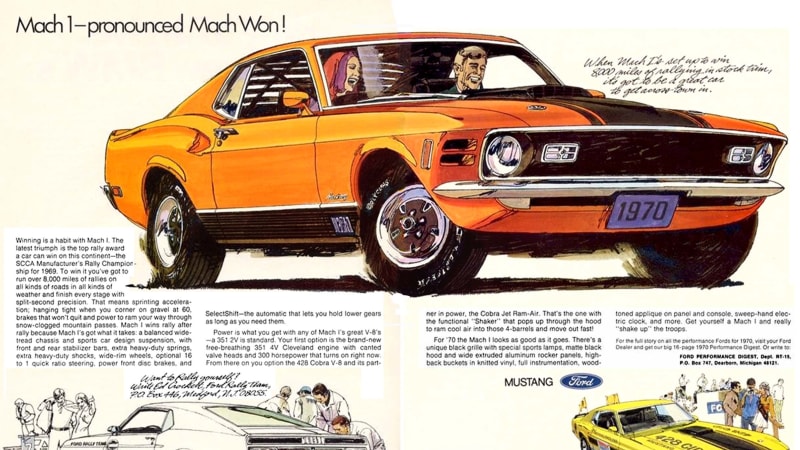Ford Mustang Mach 1: Time-traveling at the speed of sound
https://ift.tt/2XI3lYn

“Mach 1”: The term refers to the speed of sound, which is not a fixed number but varies based on the temperature of the surrounding gas. Named for Austrian physicist Ernst Mach, the term is a little science-geeky, but Ford evidently felt it connoted jet-age performance. Ford first applied the Mach 1 name to a Mustang with a 1968 show car that featured a chopped roofline and square headlights. Neither of those elements made it into the production version that arrived with the aggressively restyled new Mustang for 1969.
1969. The new Mustang Mach 1 came standard with a 351ci 2bbl V8 but a 390ci V8, or a 428ci V8 in 335-hp or 350-hp Cobra Jet form could be had. Special Mach 1 equipment included a competition suspension, a hood scoop, dual sport mirrors, and decklid graphics. All Mach 1 Mustangs were “Sportsroof” fastbacks, and more than 72,000 were sold in the first year.
1970. For 1970, the 351ci 2bbl V8 was again the Mach 1’s standard engine, with a new 300-hp 4bbl 351ci “Cleveland” V8 optional. A 428ci Cobra V8 and a 428ci Cobra Jet V8 with Ram Air were the hardcore choices.
1971. Longer, lower, wider, (and heavier), the ’71 ‘Stang was completely restyled. The Mach 1 again was offered as a Sportsroof fastback only, and came with a competition suspension, twin hood scoops (a no-cost option), a special grille and rear sail-panel treatment, black or silver lower bodywork, Mach 1 decals, and a decklid paint stripe. A 302ci V8 was standard but options included two 351ci V8s, a 429ci Cobra Jet V8, and a Drag-Pac rear axle. Oh, and an 8-track tape player could be had.
1972. The ’72 Mach 1 lost its optional 429ci V8, and the 351ci 4bbl was now the hottest engine.
1973. The last year of the big-boy Mustang, 1973 was mostly carryover for the Mach 1. A 351ci 4bbl was again the top engine offering and could be paired with a functional Ram Air induction hood that also came with a black- or silver-painted hood with locking pins. A rear spoiler was also optional, as were forged aluminum wheels.
1974. With the downsized 1974 Mustang II, the Mach 1 became the higher-spec version of the fastback — now hatchback — body style. It skipped the base model’s 2.3-liter four in favor of a 2.8-liter V6, with either a four-speed manual or a three-speed automatic. The Mach 1 V6 had fractionally larger displacement and a higher compression ratio than the V6 offered in other Mustang II models, with the result that it made 5 more horsepower for a total of 109 horsepower. No V8 was offered. The mid-Seventies bummer was in full bloom.
1975. The V8 returns! A 302-ci V8 was a new an optional upgrade over the Mach 1’s standard V6, and made a tire-roasting 122 horsepower. As in ’74, the Mach 1 (like most other Mustangs) could be fortified with a Rallye Package that brought a limited-slip differential, heavy-duty cooling, a competition suspension, a Sport exhaust system, and a leather-wrapped steering wheel.
1976. The ’76 Mach 1 remained a fastback exclusively and was the only way to get a V8 hatchback (although a 2.8L V6 was standard). The V8 could be paired with three-speed automatic or a four-speed manual. Dual racing mirrors, white-letter tires on styled-steel wheels with trim rings, decals on the fenders and rear, and black lower body accents, dressed up the Mach 1. A new Cobra II option package appeared this year and would ultimately usurp the Mach 1 as the hi-po ‘Stang.
1977. T-tops! That swinging late-’70s feature arrives as an option for the Mach 1, and well as regular Mustang fastbacks. Also new is a Rallye Appearance Package consisting of gold accents on a black or white body.
1978. Things are static for the ’78 Mustang II Mach 1, but the arrival of a second Cobra package, the King Cobra, does not portend well. Indeed, when the Mustang is redesigned for 1979, the Mach 1 is dropped, as the (just plain) Cobra takes up the performance banner.
2003. The waning years of the fourth-generation, SN-95, Mustang saw Ford dig back into the model’s performance past, first with the Bullitt then with a revived Mach 1 for 2003. The reborn Mach 1 boasted 305 horsepower from its 4.6-liter DOHC V8, slotting in between the mainstream Mustang GT’s 260 horses and the top-dog SVT Cobra’s 390. Retro-style graphics (including on the instrument faces), Magnum 500 wheels, a functional hood scoop, and a rear spoiler complete the visual makeover, while a stiffer suspension with a lower ride height and a unique exhaust system round out the mechanical upgrades. The reborn Mach 1 would stick around for the 2004 season, but with the coming of the redesigned 2005 Mustang, it nameplate would disappear again.
Until now, that is.
Auto Blog
via Autoblog https://ift.tt/1afPJWx
May 29, 2020 at 11:22AM
